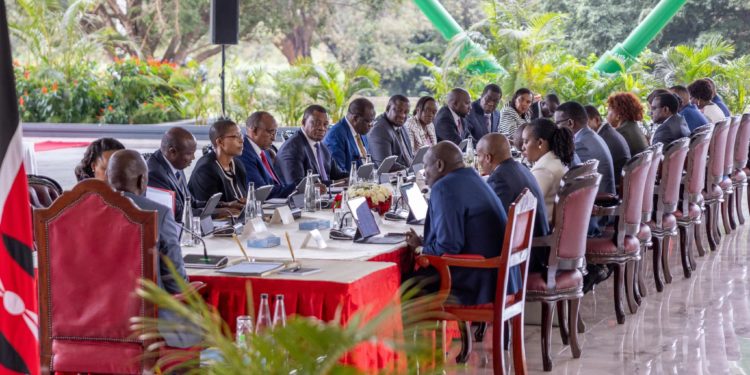The Hustler Fund has crossed the KES 57 billion disbursement mark, with President William Ruto’s Cabinet announcing the launch of a new financial product aimed at small and medium-sized enterprises (SMEs).
The new offering will initially target 2 million regular borrowers with strong credit histories, as the administration continues to expand financial inclusion efforts across the country.
The announcement came during the inaugural meeting of President Ruto’s reconstituted Cabinet, where the nation’s top policy-making organ reviewed the progress of the flagship Financial Inclusion Fund, commonly referred to as the Hustler Fund. Since its launch, the initiative has provided affordable credit to millions of Kenyans, with a strong emphasis on promoting a culture of saving.
“To date, the Fund has disbursed KES 57 billion to Kenyans, with at least 2 million customers now regular daily borrowers,” the Cabinet Office said in a statement. The success of the initiative has been bolstered by the administration’s focus on reaching traditionally underserved populations, including small-scale traders and informal sector workers.
The new SME product aims to provide further opportunities for those who have demonstrated a solid repayment track record. It marks the next phase in the administration’s broader economic strategy of integrating more Kenyans into the formal banking system, with the goal of deepening financial inclusion.
“In commemoration of the Fund’s second anniversary, Cabinet directed the rollout of a third product offering specifically focused on the Small and Medium Enterprises (SME) sector,” the statement added. This new initiative is expected to give SMEs access to more affordable credit, helping to fuel growth and job creation in the country’s vital SME sector.
Beyond the financial sector, the Cabinet also addressed other critical issues, including health reforms, anti-corruption measures, and environmental conservation.
On the healthcare front, a major structural shift was announced with the transition from the National Health Insurance Fund (NHIF) to the Social Health Authority (SHA), effective October 1, 2024. The move is part of the government’s push to accelerate the implementation of Universal Health Coverage (UHC), a key pillar of Ruto’s Bottom-Up Economic Transformation Agenda (BETA).
The new SHA will expand coverage to all school-going children under the Edu Afya programme, which previously focused only on secondary school students. In addition, the Linda Mama programme, which provides prenatal care, will now cover comprehensive postnatal care, ensuring continuity of care for mothers and their infants.
Meanwhile, the Cabinet reaffirmed its commitment to combatting corruption, with a set of governance reforms aimed at enhancing transparency and accountability in public service. These measures include the introduction of surcharges for public officials responsible for the loss of public funds, the creation of a Unified Personnel Identification System to eliminate ghost workers, and mandatory wealth declarations for all public officers.
A zero-based budgeting system will be introduced starting from the 2025/26 financial year, further strengthening fiscal discipline and transparency in government spending.
Environmental conservation also featured prominently in the discussions, with the Cabinet approving plans for the distribution of seedlings ahead of the upcoming short rains season as part of the National Landscape and Ecosystem Restoration Strategy (2023–2032). The strategy aims to plant 15 billion trees over the next decade, contributing to Kenya’s efforts to meet global environmental targets, including the Bonn Challenge and the UN Convention to Combat Desertification.


















